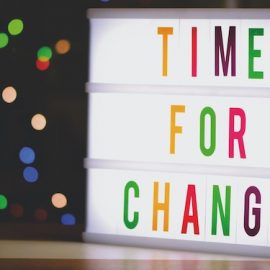

This article is an excerpt from the Shortform book guide to "We Should All Be Millionaires" by Rachel Rodgers. Shortform has the world's best summaries and analyses of books you should be reading.
Like this article? Sign up for a free trial here.
Do you have to choose between being wealthy and having an average lifestyle? How can you upgrade your life?
In her book We Should All Be Millionaires, Rachel Rodgers says that you shouldn’t have to sacrifice your lifestyle in order to make more money. In fact, she says you should upgrade the way you live so you can earn more money.
Let’s find out how to upgrade your life and stop worrying about saving money.
Focus on Growing Your Wealth, Not Shrinking Your Lifestyle
Rodgers proposes a change you must make to your approach to money: Rather than obsess over how to save money, focus on how you can make more money. This requires learning to upgrade your life. Rodgers argues that it’s hard to build wealth if you have a substandard lifestyle due to penny-pinching. For example, if you sleep on an old, broken mattress because you’re afraid to spend money on a new one, you can’t get the quality sleep needed to pursue a promotion at your job or study for a higher degree that will increase your income.
(Shortform note: Rodgers’s suggestion to not worry about saving money runs counter to advice from other financial experts. The authors of The Millionaire Next Door argue that being frugal is the foundation of wealth accumulation and that many millionaires became wealthy by budgeting their expenses and living below their means. They suggest you spend less and invest more to reduce your taxable income. So, while it likely makes sense to focus on making more money as Rodgers recommends, it may still be worthwhile to exercise some restraint in your spending, create budgets, and cut back on unnecessary expenses.)
In many cases, you must spend money to make more money. Rodgers describes steps that let you upgrade your lifestyle so you can better build the future life you want:
Step #1: Imagine your dream life in detail: your ideal home, the experiences you want to have, and the things you want to own. Calculate how much that lifestyle would cost you each month. This provides you with a clear goal to aim for and inspires you to pursue it.
(Shortform note: What if you don’t know what your dream life looks like? In The Secret, Rhonda Byrne recommends creating a vision board that allows you to visualize your dream life by collecting images. First, get a poster board and attach pictures onto it that represent the people, things, and experiences you want to have in your life. Then, place your vision board where you can see it often to further inspire you to pursue your dream life. Once you have a vision board, you should still make the cost calculations Rodgers recommends so you have a clear number to aim for when building your wealth.)
Step #2: Picture the person living that dream life—your ideal self. Think of how they treat themselves and others, how they spend their time, what they eat, and how they dress. Now, think about what changes you can make right now to be more like your ideal self. For example, you might devote more time to making home-cooked meals instead of eating fast food on the drive home from work.
| How Behaving Like Our Ideal Self Changes Our Identities In Atomic Habits, James Clear uses the concept of identity to explain why behaving like the person you want to become is an effective way to bring about personal change. He notes that your actions reinforce your identity and vice-versa. So, the more you act in a certain way, the more you start to believe that’s who you are. Therefore, if you take Rodgers’s suggestion to act like your ideal self, your actions will make you naturally start feeling like you’re that person, and you’ll continue behaving in that same manner. For example, if you spend an hour every week reviewing your finances, you’ll start to feel like a person who’s financially responsible. This identity motivates you to keep tracking your finances and use your money wisely because you’re a financially responsible person and that’s what financially responsible people do. |
Step #3: Brainstorm new ways to meet your financial goals and take your first step toward your dream life. Rodgers suggests you set a deadline for making one positive change to your life—like getting a new mattress before your birthday—and come up with ways you can make extra money. By making an upgrade to your life, you’ll improve your mood, environment, and ability to make money.
| Why You Should Sometimes Spend More to Make More In Awaken the Giant Within, Tony Robbins echoes Rodgers’s suggestion, adding that enjoying the money you have helps reinforce your motivation to build wealth. If you don’t reward yourself occasionally, you’ll associate making money with pain and sacrifice rather than pleasure, which subconsciously limits your desire and ability to build wealth. While Rodgers makes the concrete argument that upgrading your life will improve your mood, environment, and ability to make money, Jen Sincero makes a more spiritual argument for spending on yourself. In You Are A Badass, she writes that spending money to make upgrades to your life lifts you to a higher frequency of living. By being at a higher frequency, you can tap into more of the universal energy source all humans are linked to, allowing more money to flow into your life. And while Rodgers suggests you set a deadline and find ways to make money, Sincero writes that the money will come naturally: Take leaps of faith, spend the money you have, and trust that the universe will help you find ways to pay for it. |

———End of Preview———
Like what you just read? Read the rest of the world's best book summary and analysis of Rachel Rodgers's "We Should All Be Millionaires" at Shortform.
Here's what you'll find in our full We Should All Be Millionaires summary:
- Why all women can and should strive to become millionaires
- Why working harder and living more frugally will not make you wealthy
- How to develop a positive money mindset and grow your wealth






